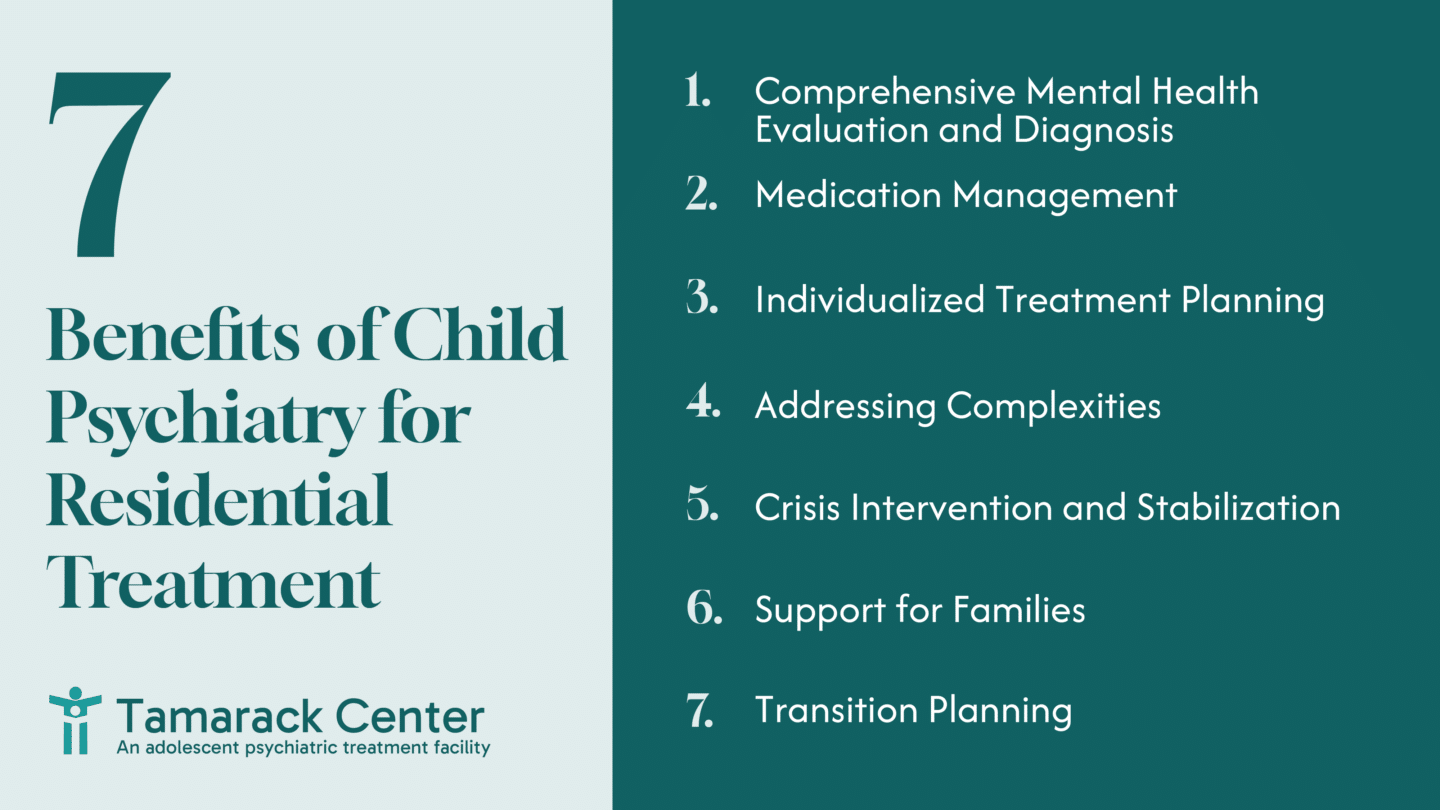Child psychiatrists play a vital role in residential treatment programs, provide comprehensive evaluations, manage medication, and create detailed, individualized treatment plans for those with complex mental health needs.
Unfortunately, there are far too few child psychiatrists to meet the current need.
According to the American Academy of Child and Adolescent Psychiatry, there are approximately 8,300 practicing child and adolescent psychiatrists in the US.
While estimates place the current need at over 30,000, patients often wait between eight weeks and six months to see a child psychiatrist — and 70% of counties in the US have no psychiatrists at all.
Tamarack prides itself on the number of qualified caring staff we have working with our residents. This includes having a full-time, on-staff child psychiatrist in our residential program who meets with each resident every week.
Having a child psychiatrist on site—every day—allows us to deliver higher quality, more effective mental health treatments to the residents in our program.
Here, we’ll explore seven benefits Tamarack Center offers by having a child psychiatrist available for our residential treatment program.
We help adolescents and teens break the cycle of self-destructive behaviors. Contact Tamarack Center to see how we can help.
7 Benefits of Child Psychiatry for Residential Treatment

1. Comprehensive Mental Health Evaluation and Diagnosis
Child psychiatrists specialize in mental health disorders of children and adolescents. They are trained medical doctors.
These professionals conduct thorough evaluations to diagnose the underlying mental health conditions in patients. Accurate diagnoses are crucial for developing effective treatment plans. Child psychiatrists have a stronger knowledge of biology and neurochemistry and take that into account during the diagnostic process.
They will look for underlying medical conditions that may be mimicking mental health issues. This creates a more accurate diagnosis and avoids mistaking a physiological issue for a mental health disorder.
2. Medication Management
Children and adolescents in residential programs are usually facing complex mental health issues. They often benefit from medication as a part of their treatment plan.
Child psychiatrists can prescribe medications, in the right dosages, for each individual’s condition along with the following:
- Monitor the response to medication, observing changes in behavior and mood.
- Assess if the medication is effective, alleviating symptoms and improving overall well-being.
- Watch for potential side effects from the medication, which might include drowsiness, mood swings, changes in appetite, or sleep disturbances.
- Adjust dosages to ensure maximum effectiveness while minimizing side effects. (Dosage adjustments are common as neurochemistry adjusts over time).
3. Individualized Treatment Planning
Because of their medical training, child psychiatrists have a deeper understanding of both the biological and neurological bases of mental health conditions. They can use that knowledge to develop more holistic treatment plans to address biological and neurological issues.
These plans might involve individual and group therapy, family therapy, medications, and other interventions.
Child psychiatrists also collaborate with therapists to review and verify the effectiveness of treatments. The plan can be adjusted and refined to improve effectiveness as needed.
4. Addressing Complexities
Children requiring residential treatment often face complex mental health issues. They may experience anxiety alongside depression and behavioral issues.
Child psychiatrists have the expertise to diagnose and treat complexities like co-occurring disorders.
They may prioritize treatments if one disorder seems more severe or poses a greater immediate risk. Other conditions will still be treated, often using interventions that address both co-occurring disorders. Child psychiatrists can also employ techniques to address commonalities between the disorders.
5. Crisis Intervention and Stabilization
Residential treatment programs often deal with children experiencing acute mental health crises.
Verbal de-escalation is a tool for de-escalation and crisis intervention — and may be all that’s required to restore a safe space. In rare cases, physical restraint may be necessary as a last resort, and the child psychiatrist collaborates to assess the necessity of high-level intervention.
In an acute crisis, medication might be necessary to stabilize the child’s mood or behavior. A child psychiatrist can prescribe short-term solutions like anti-anxiety medications or mood stabilizers. Patients will be closely watched for any potential side effects from crisis intervention medications.
6. Support for Families
Having a child in crisis affects the entire family, especially when that child is undergoing residential treatment.
Child psychiatrists provide support and guidance to the families of children in our residential treatment programs. They can help families understand the child’s diagnosis, treatment options, and coping strategies to manage the child’s mental health effectively at home.
7. Transition Planning
Transitioning out of residential care is something to celebrate, but it can also be stressful. A child may fear relapsing when they’re out of the controlled conditions of the residential center. Or be afraid they’ll forget everything they’ve learned when back in their previous circumstances. Families may feel uncertain or awkward when supporting their returning loved one.
As children approach their discharge date, child psychiatrists play a critical role.
They’ll develop a detailed transition plan with the family and treatment team before proceeding with the discharge process. This assures a comprehensive plan that addresses the child’s needs and the realities of their situation back home.
This personalized transition plan could include medication management recommendations, referrals for ongoing outpatient therapy, and educational considerations. It can also outline actions families can take for optimal support.
The child psychiatrist may provide guidance to families of returning children. They may educate families about the child’s diagnosis, how to manage any medications, and the strategies needed to support the child’s mental health at home.
A child psychiatrist might communicate with the outpatient therapists taking over the child’s care after discharge. This creates a smoother transition and maintains continuity of care.
The Tamarack Center Advantage
Having a full-time, on-staff child psychiatrist is just one of the ways Tamarack Center can provide gold-standard residential care for adolescents and teens in crisis.
Our program provides a wide variety of services to improve a young person’s situation and provide the tools they need for effective living. We provide structured schedules, recreation, education, family therapy, and medication management. All are closely managed by the high number of qualified, caring staff working with our residents.
We treat every child as a unique individual. Different children will respond differently to different services. We pay particularly close attention to what works well for the individual.
Is your child struggling with mental health? Contact Tamarack Center to find out how we can help.

